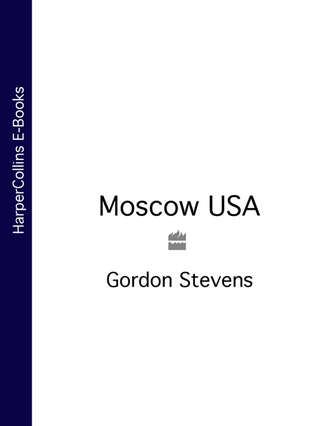
Полная версия
Moscow USA
‘Rich, it’s Jack Kincaid. I’m downstairs. I wonder if you and I should talk before I come up.’
Matthews joined him two minutes later.
‘Any problems?’ Kincaid asked.
‘They’re fidgety.’
‘So would you be if one of your people went missing with six million dollars.’
They ordered coffee, then Kincaid read through the range of reports collated by the London office: the second courier’s statement, the doctor’s report on his condition, and the background searches on both couriers, including financial details. Plus a security report on both.
‘The doctor said Pearce had a viral problem and that he’s still suffering from it?’
‘Yes.’
‘Could we arrange a lab test, see if anything could be used to produce or simulate the condition? A forensic analysis might also be useful – try the toxicology people at Aldermaston. They’ve experience of how the Soviets used to work, so they’ll know what to look for. We might need a polygraph if Pearce doesn’t play ball, or if we suspect he’s not telling us the truth.’
Matthews signed for the coffee and they went upstairs. The courier Pearce was in an armchair and two other men, a representative of the company and a lawyer, sat on a sofa. Matthews introduced them and they shook hands.
‘Before we begin there are certain guidelines.’ The lawyer was mid-thirties, public school accent, and dressed in a pinstripe suit.
Of course, the ISS man Matthews began to agree.
Kincaid smiled at the lawyer. ‘Before you say anything else, may I remind you that your clients lost six million dollars of my clients’ money.’ He smiled again. ‘I view this meeting as amicable. I also view your presence at this meeting as being at my discretion. If you have any problems with that you can leave now.’
The lawyer began to suggest to the company representative that they withdraw for a discussion.
‘I’m on the three o’clock flight back to Moscow,’ Kincaid told him. ‘Any costs incurred by any delay will be charged to you.’
The lawyer sat down.
Okay, Mike – Kincaid looked at Pearce and switched on the cassette recorder. Take me back to that morning; take me back to the night before. This viral problem, when were you first aware of it, when did you first tell Zak? How did the routine that morning differ from any other? Did you and Zak always know how much you were carrying? Who else knew …
Got to ask you this, Mike. Any chance Zak set you up, doctored your food or something so you couldn’t make the trip … He watched carefully for Pearce’s reaction. Got to ask you this as well, Mike. Any chance that you set up your own sickness, so that when Zak went into Sheremetyevo he didn’t have you by his side. Yeah, Mike, I know what I’m asking. What I’m asking is: were you part of the set-up? How do you feel about a polygraph, make sure you’re telling the truth when you deny what I’ve just said …
How about a break for refreshments, the lawyer suggested. Get something sent in, Kincaid told him.
So where do you and Zak stay in Moscow, Mike? You use a hotel or a company pad? Know anybody in Moscow? Outside the company, I mean … The stylus on a polygraph would have flickered, he was aware. What about girls, Mike? I mean, Moscow’s full of them? No girls, at all? So what the hell do you do in the evenings, because you don’t remind me of a Bolshoi man, if you know what I mean …
‘Okay,’ Pearce told him. ‘Zak and I have a couple of girls we see regularly when we’re in Moscow.’
Oh shit – Kincaid heard the slight drawing in of breath as the company representative tried not to react.
‘Couple of girls you see regularly in Paris and Rome and New York as well, I guess.’
Pearce laughed. ‘Actually not Paris or Rome because we don’t overnight there.’
This is like Dwyer at Nite Flite, Kincaid thought, this is one big honeypot.
The interview ended an hour later. It was fifty minutes to the last Moscow flight of the day. Kincaid hand-wrote a summary report on the interview, plus a request for Ivor Lukyanov to run checks on the two girls named by Pearce, and instructed Matthews to send them to Moscow on the secure fax.
The sky was laced with purple and the runway lights of Sheremetyevo were bright against the grey. The Ilyushin touched down and taxied toward the terminal. Walk to the Novotel and get the courtesy coach into town, Sherenko had said. Hope to hell immigration is quick tonight, Kincaid thought. The aircraft stopped and the seat belt sign flicked off. He stood, joined the line, and hurried off the plane. Sherenko was waiting at the top of the jetbridge. Ten minutes later they turned left out of the airport towards Moscow.
Kincaid settled in the passenger seat. ‘The pick-up’s appreciated.’
Sherenko waved the thanks aside. ‘So what about Pearce? You think the girlfriends might be involved?’
‘Pearce is straight. It could be he or Whyte let something slip, but if it was I don’t think it was Pearce.’
‘Why not?’
‘Pearce was Mountain and Arctic Warfare Cadre, therefore he’d have done the interrogation course.’
Sherenko changed down to beat a set of traffic lights. ‘Except the interrogation course doesn’t tell you what to say when somebody’s unzipping your flies. Or perhaps yours did.’
‘So what about Moscow?’ Kincaid asked.
‘You mean the interrogation course or the Contex money?’
‘Whichever.’
‘The ConTex interviews were routine though a couple of people were missing, including Maddox’s secretary. The financial backgrounds on Maddox and Dwyer are still coming in, but we might have a problem with Maddox. He’s married, but according to sources he’s having an affair with a First Secretary at the US embassy.’
‘Any indication she’s screwing with someone else as well?’
‘Not yet, but we’re checking. We’re also checking on the girlfriends of the two couriers.’
‘What about the security company who were supposed to make the pick-up?’ Kincaid asked.
‘Leaks like a sieve. The boys making the pick-up cocked up all the way down the line but seemed straightforward.’
‘You believe them?’
‘Probably.’
‘Why?’
‘The same reason you would. If I’d lifted six million, even if I had a cut of six million, I wouldn’t be in Moscow now.’
‘What about whoever runs the mafia at Sheremetyevo?’
‘Mikhail came up with a name. Alexei Kosygin. Igor’s running a check on him.’ Sherenko leaned back and handed Kincaid a box from the rear seat. ‘Present. You’re booked in at the range at six in the morning.’
They crossed the ring road and dropped toward the city centre, the traffic suddenly busy around them. Sherenko turned off the main road and into a side street, trees along the pavement and cars parked on either side.
‘So what was Moscow like five years ago today?’ Kincaid asked.
Sherenko reversed into a space and switched off the engine. ‘No idea. I wasn’t here.’
Vorkov left the glass-fronted building at Yasenevo, on the outskirts of Moscow, and was driven towards the city. It was shortly after ten.
Felix Andreyevich Vorkov was forty-three years old, tall, with dark hair swept back, well-built but even better dressed. In the old KGB Vorkov had attained the rank of major. In the new order, with the KGB disbanded and its functions divided, Vorkov had made full colonel in the SVR, the Russian Foreign Intelligence Service, formerly the First Chief Directorate.
Five years ago there had been chaos in Moscow … Five years ago today in New York Nikolai Sherenko had done the job on East 54th – the ghost came at him … Not that Vorkov knew all the details, because then, as now, Malenkov didn’t tell him everything. Thank God Malenkov had known about the bastard, though; thank God Sherenko had taken him out.
The cellphone rang.
‘Yes.’
‘The shipment’s on the way,’ he was informed. No other details, because the line wasn’t secure.
‘Good.’
Thirteen minutes later Vorkov’s unmarked car stopped outside the Up and Down Club. Vorkov told his driver he would call him when he needed collection and went inside.
Alexei Kosygin was seated at a table in the corner. Kosygin was early thirties, squat build, and dressed in a designer suit. He had two bodyguards on the next table, and two girls at his own. He greeted Vorkov, poured him a glass of champagne, and nodded that the girls should leave for a moment.
‘Za nas.’ Vorkov emptied the glass in one and allowed Kosygin to pour him another. ‘Thought you ought to know …’ It was said casually, as if it was interesting rather than important. ‘Somebody pulled your FSB file this evening.’
Kosygin poured them each another glass. ‘Which somebody?’
‘Omega, the security company. I’m not sure who in the company is looking at you. No doubt we’ll find out.’
4
The headlights bumped through the night behind him and the half moon arced like a shepherd’s crook over him. Another thirty minutes and he’d take a break. Karpov changed up and checked in the wing mirrors. Karpov was ex-military, so did things like checking rear mirrors. The man in the passenger seat unscrewed the flask and poured him a mug. Karpov swung round the bend and saw the car pulled into the roadside, saw the woman – mid-twenties and short skirt – waving to him. Christ, he laughed: must think he’d been born yesterday. He changed down and eased his foot on the accelerator. The trees on either side were like ghosts. They overtook a series of slower-moving trucks and purred on, the trees flashing by as if they, not him, were moving. The night was a brighter silver now and the man to his right was slumped in the seat, apparently asleep. Karpov rounded the bend. The Volvo was slewed at an angle, totally blocking the road.
‘We’re on,’ the man in the passenger seat whispered in the Motorola and wound down his window.
Karpov changed down and stopped thirty metres away from the Volvo. The men came out from the trees, five of them, all armed – in the dark he couldn’t make out the details. The first man reached him. His face was blackened and the gun he pointed at Karpov was a Kalashnikov. Another man joined him on the driver’s side of the cab, two others on the passenger side and one in front. What’re you carrying, they would ask; behave and you’re okay, they would tell him. Would kill him anyway.
‘Get down,’ the first man ordered him. The moon was more three-quarters than half, Karpov thought; funny how you noticed the insignificant things. ‘Get down,’ the man told him again.
The night erupted, sub-machine fire pouring in from the murk of the woods on either side, the first rounds tearing down the man giving the orders, plus the man at his side, and more slamming into the man in front of the cab. To Karpov’s right the man in the passenger seat raised his AK so that it cleared the window and squeezed the trigger.
The silence descended again. The figures came out of the trees, kicked the bodies round the cab, and made sure they were dead. ‘Bezdelniki luybiteli.’ Fucking amateurs. The turbo-charged Mitsubishi Shogun emerged from the black behind them and stopped behind the Scania. Karpov lit a Marlboro, left the cab and stepped through the carnage to the Volvo. The keys were in place. He started the engine, pulled the Volvo clear, returned to the Scania, and drove on.
Behind him the headlights of the back-up fell into position.
Kincaid’s brain was beginning to swim. He declined another vodka, knew he couldn’t win, shrugged, held up the glass in a toast, and downed another stogram. A waiter brought the next round of food, and a second the next bottle. Joshua dead and buried, so what the hell.
The party was in a private room off the main dining area; the table was circular, the centre section revolving so they could help themselves to the food piled high on the plates. Sherenko was on the other side of the table, drinking beer and an occasional malt. Grere Jameson was to his right, at Gerasimov’s side.
Mikhail Gerasimov rose and raised his glass. ‘To Alpha.’
They downed the vodka, the glasses were refilled, and someone else stood up and proposed another toast. ‘To Russia.’
Another round was poured, another toast. ‘To the job at the White House.’
‘To Afghanistan.’
‘To the bastards at the Kremlin.’
There was an uneasy silence.
Gerasimov stood again. ‘To Friends.’ He raised his glass. ‘That they, like we, never forget.’
The mood changed back again. ‘To Friends.’
When the Omega driver delivered him to the building which concealed the firing range five hours later, Kincaid’s head was surprisingly clear. There is a God, he decided, and this morning God was on his side. The range was busy. He ignored those around him, worked carefully and methodically for forty minutes, then was driven to the Omega offices. Sherenko was at his desk. They briefed Riley on their arrangements for that day, checked that Igor Lukyanov had not received any intelligence on the mafia boss Alex Kosygin or the Moscow girlfriends of the couriers Whyte and Pearce, confirmed that no body resembling Whyte’s had been brought in to the morgue on C’urupy Ulica, and drove to the ConTex offices for the interviews with non-American staff members absent the previous day. By midday they were back.
‘So?’ Sherenko settled behind his desk.
‘So last night is beginning to wreak its revenge.’
Kincaid fetched two black coffees.
‘Update on the financial backgrounds of Maddox and Dwyer.’ Riley gave them the reports. ‘All the bank accounts credited to each appear to be in order. How was ConTex?’
‘Two of the three who weren’t at work yesterday are back,’ Sherenko told him. ‘Maddox’s secretary wasn’t there again. There was a message at the switchboard that she was sick.’
Riley perched on the front of the desk. ‘What do you think?’
‘No problems with the two we interviewed.’
‘But?’
‘Money goes missing, next day Maddox’s secretary doesn’t show for work. We investigate, she goes sick.’
‘So what do you suggest?’
‘Leave it till tomorrow. If she doesn’t show, we go see her.’
The Kosygin material began to come through. Sherenko copied it and Kincaid tried the telephone numbers of the girls Pearce had given him in London the day before.
‘No answer,’ he told Sherenko.
They settled down to the material:
Alexei Ivanevich Kosygin. Born 1964. Education: School Number 20 and Moscow State Institute of International Relations. Occupation: businessman. Frequent trips to Europe and the Middle and Far East. Home and office address and telephone numbers.
‘Not much.’ Kincaid tossed his copy on to the desk. ‘Either we have the wrong man or the file’s been filleted.’ His head thumped and his mouth and throat were dry. ‘What’s the conventional wisdom from Moscow?’
Sherenko shrugged. ‘Either he’s clean, which nobody is. Or he’s bent, which everyone is. Or he has connections and somebody’s protecting him.’
Kincaid read the report again. ‘If he’s mafia, what sort of things is he running as well as the airport?’
‘Could be anything. He was educated at School Number 20, one of the top schools in Moscow, which suggests his parents were high up in the Party. He was also educated at the Institute of International Relations, which is the best there is, so his classmates will already be going places in government or business. He’ll speak at least one foreign language, certainly English, and he’s sophisticated, with good connections.’ Sherenko leaned back in his chair. ‘He’s doing the airport because that’s a nice little earner, but which probably also keeps him cosy with the FSB. He lets them know what’s going on, and they give him some protection. Probably the SVR, the foreign intelligence people as well.
‘He probably has interests in some clubs, runs one or two floors of a couple of hotels. Almost certainly he has some deals going with foreign businessmen.’ Sherenko stood up and paced the room. ‘Hell, he’s just what the Americans and the English and the French and the Germans and everybody else is screaming for. So he goes into partnership with them, fronts them. Plus he’s probably doing some share scams, might be into property, including overseas. Next time you go home you’ll probably find he owns half of New England. I mean, this guy is what the Protestant ethic and the American dream are all about. And in twenty, thirty years time he’ll be a pillar of the community.
‘Oh yeah, he’s probably having some run-ins with the banks. He’ll have taken out some loans, I mean big loans, but now some of the banks will be calling them in. So a banker goes missing, or goes dead. Gets blown up, gets shot, gets dead because someone’s put some sort of poison in his telephone, so every time he uses it he’s killing himself.
‘And each evening friend Alexei does the clubs, and picks up the girls, and has a great time.’ He looked at Kincaid. ‘Remind you of anyone?’
‘Yeah. He reminds me of the way some of America’s own great and good got started.’
‘You said it, not me.’
Something about the night before, Kincaid remembered. ‘Last night at the party.’
‘Yeah?’
‘One of the toasts was the bastards at the Kremlin, another was to Friends. What was that about?’
‘Betrayal.’ Sherenko was sharp, almost aggressive. He swung in his chair, checked the details on the report, lifted the telephone, and punched the number.
‘This is Nikolai Sherenko, from Omega. I’d like to speak with Mr Kosygin.’ He flicked the phone on to mute. ‘Kosygin also loves being called Mister.’ He flicked the mute off. ‘Sure, I’ll wait.’ He stared at the ceiling. ‘Mr Kosygin. Good afternoon. This is Nikolai Sherenko from Omega. There’s something we should talk about …’ He listened. ‘Yeah, the Tokyo at eight would be fine.’
He put the phone down.
‘So …’ Kincaid asked.
‘That was too easy. The bastard didn’t even ask who or what Omega was, or what it was about.’
‘Therefore he knows about the money?’
‘Either that or someone tipped him off.’
Gerasimov and Jameson were still out. They had a meeting with Kosygin this evening, they told Riley; like to put it on record in case there were any comebacks; like to get the company’s and ConTex’s go-ahead. Decision by six, Riley told them.
Alexei Kosygin replaced the phone and sat back in the leather executive chair he had had flown in from Berlin. The office was situated on an upper floor of the Intourist Hotel, at the end looking toward Red Square and the Kremlin. It was modern – computer, fax, shredder, three telephones, plus concealed drinks cabinet. It was also relatively secure, minders in the outer office, where his two secretaries sat, and reinforced doors.
He swung in the chair and punched Vorkov’s direct number at Yasenevo. There was no answer. He pressed the button for another line and punched the number of the cellphone. Felix Vorkov answered three seconds later.
‘It’s Alexei. The thing you mentioned last night. They’ve been in touch. I’m meeting them tonight.’
Vorkov was relaxed, as if it didn’t matter. Plus the fact that cellphones were still notoriously insecure. ‘Fine. I’ll be in touch tomorrow.’
Kosygin pressed the button for another line and called the second cellphone.
‘Yuri, it’s Alexei. Slight change of plan for tonight … Yeah, the Tokyo …’
He called the next number.
‘Olga. It’s Alexei. Change of plan for this evening. We’ll go to the Tokyo first.’ Olga knew the score and did what she was told. ‘Tell Tanya.’
So what else, who else? Because tonight was a game, and Kosygin liked games. He called the next number, spoke to the secretary, and was put through.
‘It’s Alexei. Wondered what you were doing this evening. It’s Yuri’s last night in town for a couple of weeks.’
‘Alexei, last night was Yuri’s last in town.’
‘Apparently he was delayed; he phoned me this morning.’
‘Who else is coming?’
‘Couple of girls, Olga and Tanya.’
‘You playing one of your games, Alexei?’
‘What makes you think I’m playing a game?’
‘Because I know you.’
‘So you want in?’
‘Sure.’
At five Kincaid made contact with the first of the girls named by Pearce in London. They can’t make tonight – he flicked the phone to mute and told Sherenko; she suggests tomorrow evening.
Sherenko looked across the desk. ‘Where?’
Конец ознакомительного фрагмента.
Текст предоставлен ООО «ЛитРес».
Прочитайте эту книгу целиком, купив полную легальную версию на ЛитРес.
Безопасно оплатить книгу можно банковской картой Visa, MasterCard, Maestro, со счета мобильного телефона, с платежного терминала, в салоне МТС или Связной, через PayPal, WebMoney, Яндекс.Деньги, QIWI Кошелек, бонусными картами или другим удобным Вам способом.






